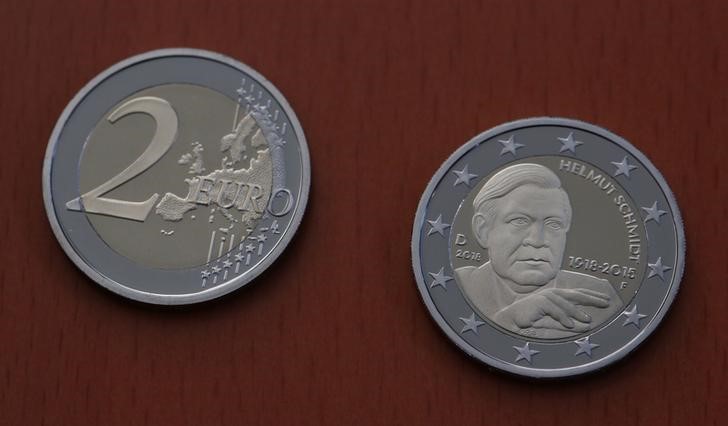By Abhinav Ramnarayan
LONDON (Reuters) - Italy's bond yield spread over its German equivalent stretched to its widest for nearly a year on Friday and the spread over Spain hit crisis-era levels on fears over the spending policies and eurosceptic outlook of the incoming Italian government.
The closely watched Italy-Germany 10-year spread, seen by many investors as a proxy for sentiment towards the euro zone, widened to 200 basis points (bps) for the first time since June. (IT10YT=RR) (DE10YT=RR).
Italian Prime Minister-designate Giuseppe Conte this week began putting together his cabinet team, with party leaders pushing for eurosceptic economist Paolo Savona to be given the pivotal post of economy minister.
Meanwhile, the equivalent Italy-Spain 10-year spread, also watched by some investors as a measure of political risk in the bloc, hit 100 bps for the first time since January 2012. (IT10YT=RR) (ES10YT=RR)
It surged to 106 bps, before tightening again after an 8-bps in Spanish 10-year government bond yields on news that Spanish Prime Minister Mariano Rajoy could face a no-confidence motion.
This Italy-Spain spread is watched because of the similarity in size and credit rating between the two southern European countries, so any significant difference in borrowing costs is considered a sign of a market under pressure.
Increasing concerns over a potential new Italian government comprising of anti-establishment parties 5-Star Movement and the League is primarily responsible for pushing these spreads wider in recent weeks.
Weakness in euro zone growth, as indicated by a recent disappointing set of PMI data, is also hurting the peripheral European bond market, analysts said.
"There's still a lot of uncertainty over Italy's fiscal policy. The thought of Savona as economy minister could be a factor but the main reason is the worries over this spending policy," DZ Bank analyst Sebastian Fellechner said.
DZ Bank analysts believe the Italy-Germany 10-year bond yield spread, which was as low as 112 bps last month, might go as wide as 250 bps if a new Italian government goes on a spending spree as promised.
"I expect a second major (widening) movement when the government will begin its work," Fellechner said.
Meanwhile, Germany's 10-year government bond yield dipped further to hit new 4-1/2 month lows of 0.44 percent, after the collapse of a summit between the United States and North Korea sparked a bid for safe haven assets.

U.S. President Donald Trump on Thursday called off a summit with North Korean leader Kim Jong Un set for next month, citing Pyongyang's "open hostility", and warned that the U.S. military was ready in the event of any reckless acts by North Korea.